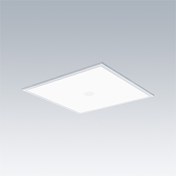Omega Pro 2 / OP2 3000-840 CKIT+ MPT E3 Q600
92921164
▶Change configuration
- Base: 92921164 — OP2 3000-840 CKIT+ MPT E3 Q600
- Optic: ANT: open area emergency optic
▼ Data Sheet
A recessed/surface/suspended, edge-lit LED luminaire. LED driver, DALI-2 dimmable with 3 hour, manual test, emergency lighting circuit. Class II electrical (this product is not earthed), IP40_IP20, Impact strength: IK03. Body: steel sheet, finished white (close to RAL9016). Diffuser: UV-stabilised polycarbonate microprismatic optic for maximised spacing with central control pod hole. Electrical connection via 7 pole piano key terminals, loop-in/loop-out possible. Complete with 4000K LED, Colour Rendering Index min.: 80
Dimensions: 597 x 597 x 57 mm
Luminaire input power: 23.7 W
Luminaire luminous flux: 3000 lm
Luminaire efficacy: 127 lm/W
Weight: 5.86 kg
Equipped with:
- Optics polycarbonate lens for anti-panic emergency lighting.
- LED
- CE
- Einb_NDaeMat
- ENEC11
- GLedReP
- 650°
- IK03
- IP40_IP20
- LLedNr
- RG0
- SC2
- Ta=0°C_to_+35°C

